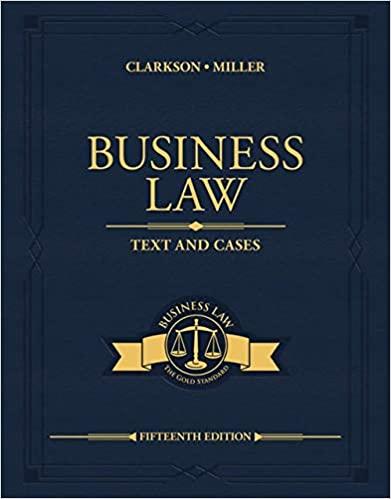Question
Discovery Computer Corporation (Discovery) is a company that sells computer equipment retail over the Internet. It has its Canadian head office in Toronto and a
Discovery Computer Corporation ("Discovery") is a company that sells computer equipment retail over the Internet. It has its Canadian head office in Toronto and a place of business in Montreal. In the late afternoon of Friday, April 4, 2005, the order pages on Discovery's Englishlanguage Web site indicated a price of $89 rather than $379 for the Tricorder X5 300 MHz handheld computer and a price of $118 rather than $549 for the Tricorder X5 400 MHz handheld computer. The pages of the site where the products were advertised listed the correct prices, however. On April 5, on being informed of the errors, Discovery blocked access to the erroneous order pages through the usual address, although the pages were not withdrawn from the site. On the morning of April 7, Jean Luc Picard, a Quebec consumer, was told about the prices by an acquaintance who sent him the detailed links, which the parties described as "deep links". These links made it possible to access the order pages without following the usual route, that is, through the home page and the advertising pages. In short, the deep links made it possible to circumvent the measures taken by Discovery. Using a deep link, Mr. Picard ordered a computer at the price of $89. Shortly after Mr. Picard placed his order, Discovery corrected the two price errors. That same day, Discovery posted a price correction notice and at the same time announced that it would not process orders for computers at the prices of $89 and $118. A Discovery employee revealed that over the course of that weekend, 354 Quebec consumers had placed a total of 509 orders for these Tricorder computers, whereas on an average weekend, only one to three of them were sold in Quebec.
On April 17, Mr. Picard demanded that Discovery honour his order at the price of $89. When Discovery refused, Mr. Picard filed a motion for authorization to institute a class action against Discovery. Discovery applied for referral of Mr. Picard's claim to arbitration pursuant to an arbitration clause contained in the terms and conditions of sale, and dismissal of the motion for authorization to institute a class action.
When Mr Picard called to demand the price be honored, he became infuriated by the sales person he encountered on the phone. He proceeded to post on Twitter and Facebook that Dana, the customer service representative that he spoke to was rude and stupid and deliberately gave him false information.
What could have been done to avoid legal action?
Step by Step Solution
There are 3 Steps involved in it
Step: 1

Get Instant Access to Expert-Tailored Solutions
See step-by-step solutions with expert insights and AI powered tools for academic success
Step: 2

Step: 3

Ace Your Homework with AI
Get the answers you need in no time with our AI-driven, step-by-step assistance
Get Started


